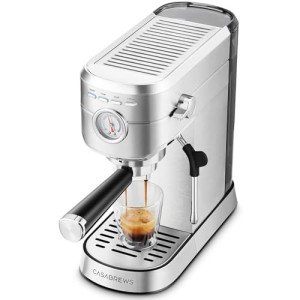5 Clarifications On Home Espresso Machines
The Rise of Home Espresso Machines: A Comprehensive Guide
As coffee enthusiasts continue to look for fresh and flavorful brews in your home, the appeal of home espresso machines has surged recently. No longer just the domain of cafes and coffee bar, these machines empower individuals to craft barista-quality espresso drinks from the convenience of their kitchens. This short article will explore the various kinds of home espresso machines, their features, and considerations for choosing the best one. Furthermore, it will provide a choice of FAQs to assist potential buyers make informed decisions.
Types of Home Espresso Machines
Home espresso machines can be categorized into a number of categories based upon their mechanisms and user-friendliness. Each type has its unique features, pros, and cons.
Type
Description
Pros
Cons
Manual Espresso Machines
Needs the user to manually manage the developing process, involving techniques like pulling a lever to create pressure.
- Complete control over brewing process
- Compact design
- Requires ability and practice
- Time-consuming
Semi-Automatic Machines
Machine automates water flow and pressure, but the user still controls the dosing and duration of the developing procedure.
- Balance of automation and control
- Versatile
- Learning curve for refining methods
Completely Automatic Machines
Automates the whole brewing procedure, from grinding to brewing, typically with programmable settings for customized beverages.
- Extremely easy to use
- Quick and hassle-free
- Less control over the developing process
- Higher rate point
Capsule or Pod Machines
Utilizes pre-packaged espresso pills or pods to create coffee quickly and quickly.
- Extremely easy to use
- Minimal cleanup
- Limited taste range
- More costly per cup than ground coffee
Super-Automatic Machines
Integrates functions of completely automatic machines with integrated grinders, allowing users to brew entire bean espresso and milk-based drinks with one touch.
- All-in-one benefit
- Ideal for milk-based beverages
- Often the most pricey
- Can be large
Functions to Consider
When choosing a home espresso machine, prospective buyers must consider the following functions to ensure they pick a machine that fulfills their needs:
Grinder Type:
- Built-in grinders can supply fresher grounds however may need more upkeep.
- Different mills enable more personalization of grind size.
Pressure:
- Look for machines that produce at least nine bars of pressure, which is optimum for developing espresso.
Water Temperature Control:
- Machines with adjustable temperature level settings permit much better extraction of flavor from beans.
Milk Frothing Options:
- Consider whether you desire a manual steam wand for frothing or an automatic milk frother for convenience.
Ease of Cleaning:
- Machines with detachable parts and self-cleaning functions substantially decrease cleanup time.
Size and Design:
- Ensure the machine fits conveniently in your kitchen and lines up with your visual choices.
Budget:
- Set a budget before beginning your search, as costs can vary significantly from affordable models to high-end machines.
Advantages of Home Espresso Machines
Owning a home espresso machine uses many advantages:
- Cost-Effective: Over time, brewing espresso at home can save coffee lovers money compared to frequent coffee shop check outs.
- Customization: Users can experiment with various beans, grind sizes, and developing techniques to discover their best cup.
- Convenience: The capability to brew espresso whenever removes the requirement to go out to a coffee shop, especially helpful during late nights or early mornings.
- Quality assurance: With a home machine, individuals have complete control over the quality of components and brewing procedures.
Disadvantages of Home Espresso Machines
Nevertheless, there are some disadvantages to think about:
- Initial Investment: High-quality espresso machines can be costly, requiring a substantial upfront investment.
- Learning Curve: Mastering the art of espresso brewing can require time and practice, which might be intimidating for newbies.
- Maintenance: Like any appliance, espresso machines require routine cleansing and upkeep to guarantee ideal efficiency.
FAQs
1. What is the very best kind of home espresso machine for novices?
Response: For beginners, a semi-automatic machine is frequently recommended as it uses a balance in between control and automation, allowing you to discover the fundamentals without frustrating intricacy.
2. How Automatic Espresso Machines should I spend on a home espresso machine?
Response: Entry-level machines can start around ₤ 100 to ₤ 300, while higher-end models can vary from ₤ 500 to over ₤ 2000. It's vital to set a budget based on your anticipated usage and wanted functions.
3. Do I require a separate grinder?
Response: While some espresso machines come with built-in grinders, buying a different grinder permits greater modification and ensures better quality premises.
4. How frequently should I clean my espresso machine?
Answer: Cleaning frequency can differ by machine type, however it's usually advised to clean up the machine after each use and carry out deep cleanings weekly or regular monthly, depending on use.
5. Can I make milk-based beverages with any espresso machine?
Response: Not all machines come with milk frothing abilities. If you take pleasure in beverages like lattes or cappuccinos, search for a machine with a steam wand or automatic frother.
Home espresso machines are changing the method coffee enthusiasts enjoy their precious brews. With numerous types and advanced features available in the market, there is something for everyone. Whether it's the pleasure of creating distinct recipes or just relishing the best shot of espresso, investing in a home espresso machine can enhance both the coffee-drinking experience and the quality of life for coffee fans all over. Similar to any investment, it is important to weigh the benefits against the potential disadvantages and pick a machine that effortlessly fits both your way of life and choices.
